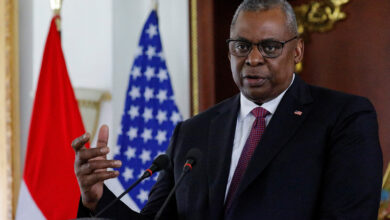The United States government is considering giving less money to the Egyptian military and more to economic development agencies after the departure of former President Hosni Mubarak, breaking from the decades-long tradition of bolstering Egypt’s armed forces, according to a non-profit report examining US aid to the region.
In a July report, the Project on Middle East Democracy, a Washington, DC-based non-governmental organization (NGO), said that reallocating Egyptian aid money to pro-democracy groups and economic development projects had gained traction among American policy-makers.
Senator John Kerry said publicly in March that the US needed to “shift the balance” of the money it gives to Egypt.
The report also said that much of the US$165 million has already been allocated and is set to be distributed to the country, as part of the US$1 billion that President Barack Obama promised to Egypt in the immediate aftermath of Mubarak’s exit.
Of the money distributed so far, US$100 million was for economic support and US$65 million for democratic development, with nearly all of the money going to Egyptian and international organizations that work in the fields of civic engagement, awareness and human rights.
In its report, the project criticized a recently formed government committee, commissioned by Minister of Planning and International Cooperation Fayza Abouelnaga, that aims to investigate the sources of foreign funding of local NGOs.
The move on the part of the minister, the report said, “was perceived as intended to intimidate local Egyptian NGOs, discourage them from accepting foreign funding, and undermine the credibility of those organizations that do accept such funding.”
The Project on Middle East Democracy, which is officially affiliated with the Carnegie Endowment for International Peace, lobbies for the promotion of democratic political activities in the Middle East. According to its website, the project’s mission is: “Through dialogue, research, and advocacy, we work to strengthen the constituency for U.S. policies that peacefully support democratic reform in the Middle East.”
Saad al-Din Ibrahim, an exiled rights activist under Mubarak, is on the group's board of directors.
A 2009 agreement between the Mubarak government and USAID stipulated that Egyptian NGOs are not allowed to take American funds without official oversight. But when Mubarak stepped down, the United States scrapped the agreement, directly giving NGOs USAID money.
The US Federal Budget and Appropriations for Fiscal Year 2012, a not-yet finalized version of the coming year’s budget, asks the American government provide a total of US$1.55 billion to Egypt.
The US has long been Egypt’s largest foreign assistance donor. Since the 1980s, the United States has given US$1.3 billion yearly to the Egyptian military, and since 2009, the US has also provided US$250 million in economic assistance yearly.
It appears the US will be bumped from this position as top donor, though, after Egypt’s decision to accept large grants of money from Gulf States to help Egypt cover its budget deficit during the transition.
Egypt still ranked second among the recipients of US money in the region for military and security purposes, and fourth in overall aid, after Israel, Afghanistan, and Pakistan. Aid to Iraq saw the largest overall cut in allocated money.
The new budget allocations to Egypt, however, could face opposition from within the US government.
A bill currently in US Congress proposes that US aid be given to Egypt only if the new government “is not directly or indirectly controlled by a foreign terrorist organization,” a label some American policymakers might apply to the Muslim Brotherhood.




